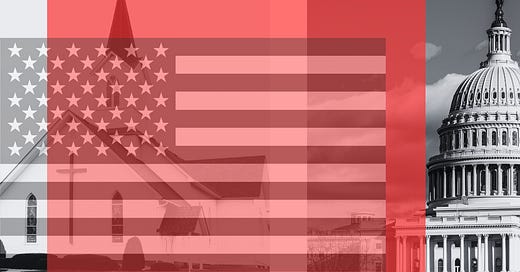Christian Nationalism and the Illusion of Persecution
The loss of religious privilege is not persecution.
From the beginning of the Church, followers of Jesus have faced persecution and hardship. The Hebrew Christians in Jerusalem endured suffering—disenfranchisement, imprisonment, and even martyrdom—echoing Jesus' warnings. The trials he foretold—earthquakes, famines, plagues, and religious persecution—were not metaphorical. They were and remain a lived reality for countless Christians around the world.
Yet, there is a dangerous distortion of the concept of persecution taking up residence in the most powerful offices in our nation. The rise of Christian Nationalism in the United States—especially within predominantly white churches—exploits the language of faith and suffering, twisting it to serve political ends. Many who claim to be persecuted in our country are not facing torture, disenfranchisement, or death for their beliefs; rather, they are experiencing the loss of religious privilege. Being told that public schools cannot mandate Christian prayer is not persecution. Recognizing that the nation’s identity is more than religious propaganda interwoven with political ambition is not an attack on faith.
Christian Nationalism attempts to use Jesus as a shield for its political agenda, weaponizing the gospel for propaganda and turning the Church into a mere tool of the state. It is not a matter of conservative or liberal politics; it is a theological heresy that the Church must address. Christian Nationalism is the antithesis of the Good News proclaimed in the Jordan River by John the Baptist, taught by Jesus, and carried forth by his disciples. It preaches violence over peace, exclusion over grace, and nationalism over the kingdom of God.
David French rightly notes, “The problem with Christian nationalism isn’t with Christian participation in politics but rather the belief that there should be Christian primacy in politics and law. It can manifest itself through ideology, identity and emotion. And if it were to take hold, it would both upend our Constitution and fracture our society.”[i]
The establishment of the White House Faith Office will further entrench this distortion of Christianity.[ii] This office will provide spiritual justification, the appearance of divine blessing, for policies that starkly contrast Christ’s teachings. Rather than challenging power with truth, as Jesus did before Pilate, the office will reinforce a theology that the blessed are the powerful while neglecting the marginalized.[iii] This blending of religious rhetoric with political power is not new—Herod did the same when he built the grand temple Jesus said would fall. When the state co-opts faith, it ceases to be prophetic and becomes an idol of power.
The Church must not be silent in the face of this growing threat. As Rev. Fleming Rutledge reminds us, “Evil is more than the sum of individual misdeeds. Evil has a life of its own. It is not enough to stand aside from it. If it is not actively resisted, it sweeps all before it.”[iv] The rise of Nazi Germany forced the Church to re-engage with its apocalyptic theology, reminding us that given the chance, humanity will often place its trust in the Herods of the world rather than in the grace of God. Today, Christian Nationalism forces us to reexamine what it means to be disciples of Christ in a world where faith is being manipulated to justify empire.
Howard Thurman, the Christian mystic and preacher, once wrote, “We are not an island, we do not live alone.”[v] Turning a blind eye or assuming that Christian Nationalism will not affect us is no different from actively enabling its rise. The call of discipleship is not passive. It requires resistance. Jesus warned his followers that the world would hate them, that they would be brought before rulers, and that they would be tested. Our struggle is not against individual political leaders but against the forces that seek to align Christianity with state power at the expense of the gospel’s integrity.
Yet, even in the face of rising Christian Nationalism, we hold onto the hope that evil does not have the last word. Paul wrote to the church in Rome—a church facing persecution—“Faith comes from what is heard, and what is heard comes through the word of Christ.”[vi] The Church must reclaim its voice and tell the truth: Christ is Lord, and no government, ideology, or national identity can replace him. The promise of Jesus is not the establishment of a Christian empire but the inbreaking of God’s kingdom—a kingdom of mercy, justice, and love.
We have a word to speak today: death, destruction, and evil do not hold the final say. Jesus Christ shines brighter than the grandest temples, whether in first-century Jerusalem or twenty-first-century Washington, D.C. Christian Nationalism will fall, as all earthly empires do, because Christ is Lord.
[i] French, David. “What Is Christian Nationalism, Exactly?” The New York Times, The New York Times, 25 Feb. 2024, www.nytimes.com/2024/02/25/opinion/christian-nationalism.html.
[ii] “President Trump Announces Appointments to the White House Faith Office.” The White House, The United States Government, 8 Feb. 2025, www.whitehouse.gov/presidential-actions/2025/02/president-trump-announces-appointments-to-the-white-house-faith-office/.
[iii] French.
[iv] Rutledge, Fleming. Advent: The Once and Future Coming of Jesus Christ. William B. Eerdmans Publishing Company, 2018.
[v] Thurman, Howard. Meditations of the Heart. Beacon Press. 1999.
[vi] Romans 10:17





